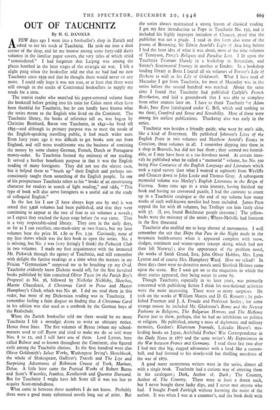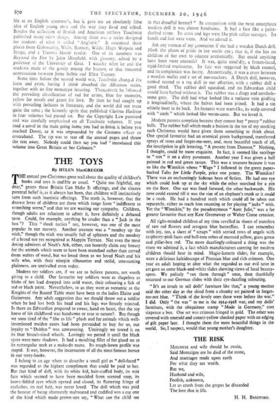OUT OF TAUCHNITZ
By H. G. DANIELS
AFEW days ago I went into a bookseller's shop in Zurich and asked to see his stock of Tauchnitz. He took me into a dark corner of the shop, and let me browse among some forty-odd dusty volumes in the familiar paper covers, the very titles of which cried "remaindered." I had forgotten that Leipzig was among the places bombed in the later stages of the strategic air war. I felt a slight pang when the bookseller told me that he had had no new Tauchnitz since 1939 and that he thought there would never re any more. I could only hope it was not true, or at least that there were still enough in the stocks of Continental booksellers to supply my needs for a time.
The tourist reader who snatched his paper-covered volume from the bookstall before getting into his train for Calais must often have been thankful for Tauchnitz, but he can hardly have known what the series meant to the English who lived on the Continent. The Tauchnitz library, the books of reference tell us, was began by Christian Bernhard, Baron von Tauchnitz, in 1841—he lived till 1895—and although its primary purpose was to meet the needs of the English-speaking travelling public, it had much wider uses. Even forty years ago it was difficult to get books sent out from England, and still more troublesome was the business of remitting the money by some clumsy German, French, Dutch or Portuguese money-order. So Tauchnitz formed the mainstay of our reading. It served a further beneficent purpose in that it was the English reading of many foreigners. They did not use the phrase then, but it helped them to " brush up " their English and perhaps un- consciously taught them something of the English people. In one of his prospectuses Tauchnitz refers to his " books of an entertaining character for readers in search of light reading," and adds, " This type of book will also serve foreigners as a useful aid to the study of colloquial English."
In the last list I saw (I have always kept one by me) it was stated that 5,926 volumes had been published, and that they were continuing to appear at the rate of four to six volumes a month ; so I expect they reached the 6,000 stage before :he war came. That is a very respectable-sized library. They cost in the early days, as far as I can recollect, one-mark-sixty or two francs, but my latex volumes bear the price M. I.8o or Frs. 2.5o. Curiously, none of my lists shows which was the first book to open the series. No.
is missing, but No. 2 was (very fittingly I think) the Pickwick Club in two volumes. I made my first acquaintance with the immortal Mr. Pickwick through the agency of Tauchnitz, and still remember with delight the furtive readings at a time when the masters in my Frisian " Gymnasium " supposed me to be brushing up my OA id. Tauchnitz evidently knew Dickens would sell, for the first hundred books published by him contained Oliver Twist (or the Parish Boy's Progress) as No. 36, followed by Nicholas Nickleby, Sketches, Martin Chuzzlewit, A Christmas Carol in Prose and Master Humphrey's Clock, which was No. 96. I did no read them in this order, but most of my Dickensian reading was in Tauchnitz. I remember feeling a faint disgust on finding that A Christmas Carol in his edition was also used as a textbook by the German boys of the Realschule.
When the Zurich bookseller told me there would be no more Tauchnitz I felt a nostalgic desire to write an obituary notice. Hence these lines. The five volumes of Byron (whom my school- masters used to call Byern and tried to make me do so too) were Nos. 8 to 12, and I still have one of them. Lord Lytton, here called Bulwer and so known throughout the Continent, also figured early among the Tauchnitz choices. In the first hundred were also Oliver Goldsmith's Select Works, Washington Irving's Sketchbook, the whole of Shakespeare, Gulliver's Travels and The Life and Surprising Adventures of Robinson Crusoe of York, Mariner, Defoe. A little later came the Poetical Works of Robert Burns and Scott's Waverley, Ivanhoe, Kenilworth and Quentin Durward. But for Tauchnitz I might have left Scott till it was too late to acquire Scott-mindedness.
What came in between these numbers I do not know. Probably there were a good many ephemeral novels long out of print. But
the series always maintained a strong leaven of classical reading I got my first introduction to Pope in Tauchnitz No. 152, and it included his highly improper imitation of Chaucer, proof that the publisher was not a prude. I read in this form also some of the poems of Browning, Sir Edwin Arnold's Light of Asia long before I had the least idea of what it was about, most of the nine volumes of Tennyson, Percy's Reliques and Paradise Lost. I lit upon the Tauchnitz Tristram Shandy in a bookshop in Rotterdam, and Sterne's Sentimental Journey in another at Emden. In a bookshop lending library at Bonn I found all six volumes of Forster's Life of Dickens as well as his Life of Goldsmith. What I have read of Macaulay I got from Tauchnitz, for most of Macaulay was in the series before the second hundred was reached. About the same time I found that Tauchnitz had published Carlyle's French Revolution, and laid a groundwork that I was able to complete from other sources later on. I have to thank Tauchnitz ''or Adam Bede, lane Eyre (catalogued under C. Bell, which said nothing to me then), Cranford and Sense and Sensibility. Most of these were among his earliest publications. Thackeray also was early in the series.
Tauchnitz was besides a friendly guide, who went by one's side, like a kind of Everyman. He published Johnson's Lives of the English Poets in two volumes and Matthew Arnold's Essays in Criticism, three volumes in all. I remember dipping into them in a shop in Brussels, but did not buy them ; they seemed too formid- able, or I may have been in a too frivolous mood. At certain inter- vals he published what he called a "memorial " volume, his No. 500 being Five Centuries of the English Language and Literature which took a rapid survey (just what I wanted at eighteen) from Wycliffe and Chaucer down to John Locke and Thomas Gray. A subsequent memorial volume was Morley's English Literature in the Reign of Victoria. Some time ago in a train journey, having finished my book and having no crossword puzzle, I had the curiosity to count up in a Tauchnitz catalogue at the end of my volume how many works of each well-known novelist had been included. James Payn topped the list with 68 volumes, but Trollope ran him fairly close with 57. (I, too, found Barchester people tiresome.) The yellow- backs were the mainstay of the series ; Whyte-Melvillc had fourteen in the first thousand.
Tauchnitz also enabled me to keep abreast of movements. I well remember the stir that Ships that Pass in the Night made in the mountain health-resorts when it appeared complete with snow, sledges, sentiment and winter-sports (except skiing, which had not then left Norway) ; also the appearance of the problem novel, the works of Sarah Grand, Iota, John Oliver Hobbes, Mrs. Lynn Lynton and of course Mrs. Humphrey Ward. How we talked! In those days there were no detective novels until Sherlock Holmes came upon the scene. But I soon got on to the magazines in which the short stories appeared, they being easier to come by.
Though Tauchnitz, especially in its later years, was primarily concerned with publishing fiction I think his non-fictional activities were the more interesting. There were so many surprises. He took on the works of William Morris and D. G. Rossetti ; he pub- lished Freeman and J. A. Froude and Professor Seeley ; for some strange reason he included Mr. Gladstone's Rome and the Newest Fashions in Religions, The Bulgarian Horrors and The Hellenic Factor just to show, perhaps, that he had no inhibitions on politics or religion. He published, among a mass of diplomatic and military memoirs, Gordon's Khartoum Journals, Lafcadio Hearn's mis- leading books on Japan, Archibald Forbes' War Correspondence in the Daily News in 1877 and the same writer's My Experiences in the War between France and Germany. I read these last two after I had met that big, rugged adventurer with a head like a cannon- ball, and had listened to his slowly-told but thrilling anecdotes of the war of 1870.
A good many anonymous writers were in the series, almost all with a single book. Tauchnitz had a curious way of entering them in his catalogues ; Dark, Author of. Dark ; The Country, Author of. The Country. There were at least a dozen such, but I never bought these lucky dips, and I never met anyone who had. I bought Frank Fairleigh without knowing the name of the author. It was when I was at a crammer's, and the book dealt with
life at an English crammer's, but it gave me an absolutely false idea of English young men and the way they lived and talked. Besides the collection of British and American authors Tauchnitz published many othrs• things. Among them was a series designed for students of what is called " Anglistik." It contained short pieces from Galsworthy, Wells, Bennett, Wilde, Hugh Walpole and Synge, and a Thomas Hardy reader. One of its numbers was Reynard the Fox by John Masefield, with glossary, edited by a professor of the University of Graz. I wonder what he and the students made of the gossip among the beaters, or that immortal conversation between Jame Selbie and Ellen Tranter.
Some time before the second world war, Tauchnitz changed his form and print, having I think absorbed the Albatross series, together with its fine monotype lettering. Thenceforth he followed the prevailing classification of red for crime, blue for memoirs, yellow for novels and green for love. By then he had caught up with prevailing fashions in literature, and the world did not seem quite the same ; the leisurely spirit that published Clarissa Harlowe in four volumes had passed on. But the Copyright Law persisted and was carefully emphasised on all Tauchnitz volumes. If you read a novel in the train going home you had to finish it before you reached Dover, or it was impounded by the Customs officer as contraband. The tip was to tear off the unread pages and throw the rest away. Nobody could then say you had " introduced this volume into Great Britain or her Colonies."



































 Previous page
Previous page